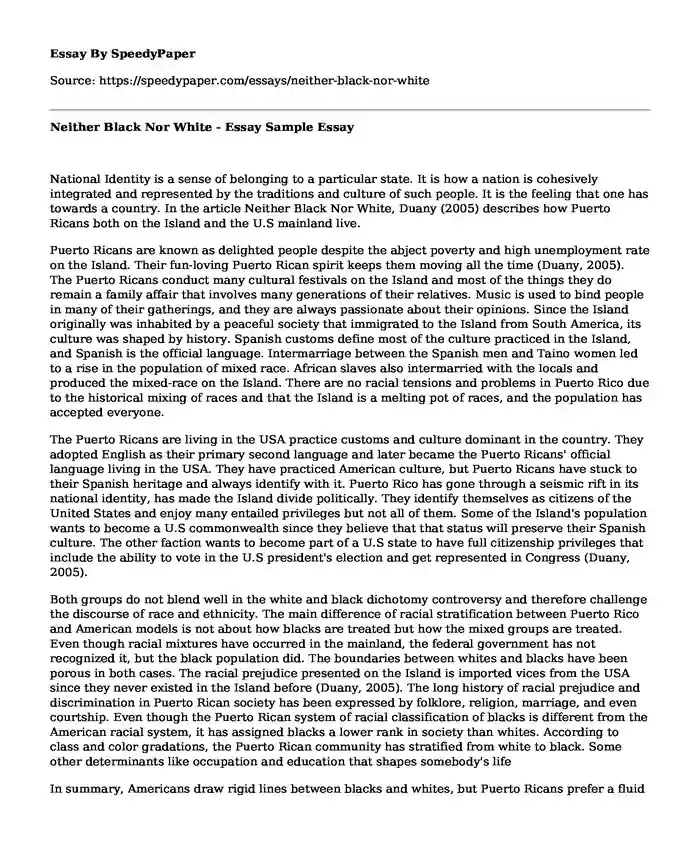
| Type of paper: | Essay |
| Categories: | Race Personality Society |
| Pages: | 3 |
| Wordcount: | 731 words |
National Identity is a sense of belonging to a particular state. It is how a nation is cohesively integrated and represented by the traditions and culture of such people. It is the feeling that one has towards a country. In the article Neither Black Nor White, Duany (2005) describes how Puerto Ricans both on the Island and the U.S mainland live.
Puerto Ricans are known as delighted people despite the abject poverty and high unemployment rate on the Island. Their fun-loving Puerto Rican spirit keeps them moving all the time (Duany, 2005). The Puerto Ricans conduct many cultural festivals on the Island and most of the things they do remain a family affair that involves many generations of their relatives. Music is used to bind people in many of their gatherings, and they are always passionate about their opinions. Since the Island originally was inhabited by a peaceful society that immigrated to the Island from South America, its culture was shaped by history. Spanish customs define most of the culture practiced in the Island, and Spanish is the official language. Intermarriage between the Spanish men and Taino women led to a rise in the population of mixed race. African slaves also intermarried with the locals and produced the mixed-race on the Island. There are no racial tensions and problems in Puerto Rico due to the historical mixing of races and that the Island is a melting pot of races, and the population has accepted everyone.
The Puerto Ricans are living in the USA practice customs and culture dominant in the country. They adopted English as their primary second language and later became the Puerto Ricans' official language living in the USA. They have practiced American culture, but Puerto Ricans have stuck to their Spanish heritage and always identify with it. Puerto Rico has gone through a seismic rift in its national identity, has made the Island divide politically. They identify themselves as citizens of the United States and enjoy many entailed privileges but not all of them. Some of the Island's population wants to become a U.S commonwealth since they believe that that status will preserve their Spanish culture. The other faction wants to become part of a U.S state to have full citizenship privileges that include the ability to vote in the U.S president's election and get represented in Congress (Duany, 2005).
Both groups do not blend well in the white and black dichotomy controversy and therefore challenge the discourse of race and ethnicity. The main difference of racial stratification between Puerto Rico and American models is not about how blacks are treated but how the mixed groups are treated. Even though racial mixtures have occurred in the mainland, the federal government has not recognized it, but the black population did. The boundaries between whites and blacks have been porous in both cases. The racial prejudice presented on the Island is imported vices from the USA since they never existed in the Island before (Duany, 2005). The long history of racial prejudice and discrimination in Puerto Rican society has been expressed by folklore, religion, marriage, and even courtship. Even though the Puerto Rican system of racial classification of blacks is different from the American racial system, it has assigned blacks a lower rank in society than whites. According to class and color gradations, the Puerto Rican community has stratified from white to black. Some other determinants like occupation and education that shapes somebody's life
In summary, Americans draw rigid lines between blacks and whites, but Puerto Ricans prefer a fluid continuum of their physical types. In essence, competing and different racial discourses have produced portraits that are incompatible about racial identity on the Island and the mainland. Many Puerto Ricans see themselves as white on the Island, whereas most consider themselves as neither black nor white but some race members in the continent. To most Americans, Puerto Ricans occupy an ambiguous position between whites and the people of color. The Island has been a racial paradise because of the prevailing and acceptance of racial mixtures on the Island. It has been a racial democracy where the blacks, whites, and people of color have lived in harmony without much prejudice.
Reference
Duany, J. (2005). Neither Black nor White: The Representation of Racial Identity among Puerto Ricans on the Island and in the US Mainland. Neither Enemies nor Friends: Latinos, Blacks, Afro-Latinos.
Cite this page
Neither Black Nor White - Essay Sample. (2023, Dec 16). Retrieved from https://speedypaper.net/essays/neither-black-nor-white
Request Removal
If you are the original author of this essay and no longer wish to have it published on the SpeedyPaper website, please click below to request its removal:
- Essay Example on How Conflicts Bring Out the Best and the Worst of Humanity
- Marcus Garvey Essay Example
- Check City Branding Examples in Our Free Essay
- Research on National Intelligence Challenges. Essay Sample.
- Free Essay on Gender Equality: Women on Corporate Boards of Directors
- Review of an Article: History WW2. Essay Example
- Literature on Slavery and Freedom - Paper Example
Popular categories




